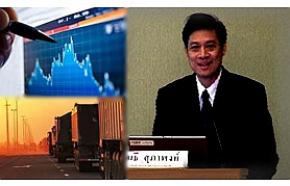ID :
164718
Mon, 02/28/2011 - 13:12
Auther :
Shortlink :
http://m.oananews.org//node/164718
The shortlink copeid
Violence in Libya has slightly affected Thai exports, says BOT

BANGKOK, Feb 28 (TNA) - The Bank of Thailand (BOT) said on Monday (Feb 28) that ongoing unrest in Libya has slightly affected Thai exports.
Mathee Supapong, senior director of BOT's domestic economy office, acknowledged that the political violence in Libya and other countries in the Middle East and the North African region has had indirect impacts on Thailand, as world oil prices are rising and the Thai central bank is closely monitoring to see whether the situation is escalating and how long they will persist.
Mathee said, however, that he has not seen any serious impact on Thailand's trade and exports, as Thai exports to the Middle East and the North African region normally account for less than 5 per cent of the country's total export; while Thailand's imports from the troubled regions account for only about 12 per cent of its total import. Regarding tourism, the senior BOT official noted that travelers from the Middle East also account for only 2.8 per cent of all foreign tourist arrivals in Thailand.
The senior central bank director said, however, that he is now more concerned over rising inflation in Thailand, resulting from rising prices of oil and other products. Thailand's inflation rate stood at 3.03 per cent in January 2011 and is projected to further rise by 4-6 per cent over the next 12 months, as the prices of capital and services are likely to increase by 3-6 per cent.
Meanwhile, the Thai economy continued to grow in January 2011, as income from agricultural products were high and rose by 30.6 per cent--which has boosted local consumers' purchasing power--and investment projects in the local private sector expanded by 13 per cent--although Thailand posted a trade deficit of 588 million US dollars in the same month, the Kingdom's first external trade shortfall in five months. (TNA)
Mathee Supapong, senior director of BOT's domestic economy office, acknowledged that the political violence in Libya and other countries in the Middle East and the North African region has had indirect impacts on Thailand, as world oil prices are rising and the Thai central bank is closely monitoring to see whether the situation is escalating and how long they will persist.
Mathee said, however, that he has not seen any serious impact on Thailand's trade and exports, as Thai exports to the Middle East and the North African region normally account for less than 5 per cent of the country's total export; while Thailand's imports from the troubled regions account for only about 12 per cent of its total import. Regarding tourism, the senior BOT official noted that travelers from the Middle East also account for only 2.8 per cent of all foreign tourist arrivals in Thailand.
The senior central bank director said, however, that he is now more concerned over rising inflation in Thailand, resulting from rising prices of oil and other products. Thailand's inflation rate stood at 3.03 per cent in January 2011 and is projected to further rise by 4-6 per cent over the next 12 months, as the prices of capital and services are likely to increase by 3-6 per cent.
Meanwhile, the Thai economy continued to grow in January 2011, as income from agricultural products were high and rose by 30.6 per cent--which has boosted local consumers' purchasing power--and investment projects in the local private sector expanded by 13 per cent--although Thailand posted a trade deficit of 588 million US dollars in the same month, the Kingdom's first external trade shortfall in five months. (TNA)





